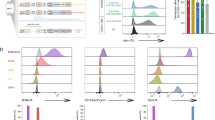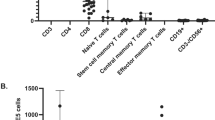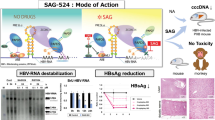Abstract
CD4 molecule, a surface marker of helper T lymphocytes, interacts with gp 120 of human immunodeficiency virus (HIV) with a high affinity and, hence, serves as a virus receptor. Soluble chimeric CD4-immunoglobulin (Ig) possesses anti-HIV activity due to its binding activity to gp 120. Furthermore, this recombinant molecule has unique Ig-like properties representing Fc receptor-binding activity and a long half-life in vivo. In this report we have thoroughly evaluated the effect of this compound on HIV infection using different in vitro systems. Treatment with 4 μg/ml of recombinant CD4-Ig after infection completely blocked the HIV-specific cytopathic effect, antigen expression, and virus release in MT-4 cells, a human T cell line which is highly susceptible to HIV. Similarly, this molecule blocked the HTLV-III/B and YU-1 strains of HIV infection in peripheral blood mononuclear cells even at 1 μg/ml. Pretreatment of the Fc receptor-positive cell line U937 with this reagent resulted not in enhancement but again in blocking of HIV infection. About 95% of HIV infection was inhibited in U937 cells when cells were treated with this compound at the time of exposure to HIV. Recombinant-CD4-Ig also completely inhibited HIV-induced syncytia formation between MOLT-4 and MOLT-4/HIV and resulting virus release at 8 and 2 μg/ml, respectively. Due to its stability and long half-life, this compound could be a promising therapeutic agent against HIV infection.
Similar content being viewed by others
References
Allan JS, Strauss J, Buck DW (1990) Enhancement of SIV infection with soluble receptor molecules. Science 247:1084–1088
Biddison WE, Rao PE, Talle MA, Goldstein G, Shaw S (1982) Possible involvement of the OKT4 molecule in T cell recognition of class II HLA antigens. J Exp Med 156:1065–1076
Byrn AR, Mordenti J, Lucas C, Smith D, Marsters SA, Johnson JS, Cossum P, Chamow SM, Wurm FM, Gregory T, Groopman JE, Capon DJ (1990) Biological properties of CD4 immunoadhesin. Nature 344:667–670
Capon DJ, Chamow SM, Modenti J, Marsters SA, Gregory T, Mitsuya H, Byrn RA, Lucas C, Wurm FM, Groopman JE, Broder S, Smith DH (1989) Designing CD4 immunoadhesins for AIDS therapy. Nature 337:525–531
Chowdhury MIH, Koyanagi Y, Kobayashi S, Hamamoto Y, Yoshiyama H, Yoshida T, Yamamoto N (1990) The phorbol ester TPA strongly inhibits HIV-1 induced syncytia formation but enhances virus production: possible involvement of protein kinase C pathway. Virology 176:126–132
Clapham PR, Weber JN, Whiteby D, McIntosch K, Dalgleish AG, Madon PJ, Denn KC, Sweet RW, Weiss RA (1989) Soluble CD4 blocks the infectivity of diverse strains of HIV and SIV for T cells and monocytes but not for brain and muscle cells. Nature 337:368–370
Dalgleish AG, Beverley PCL, Clapham PR, Crawfard DH, Greaves MF, Weiss RA (1984) the CD4(T4) antigen is an essential component of the receptor for AIDS retrovirus. Nature 312:763–767
Deen KC, McDougal JS, Inacker R, Foleina-Wasserman G, Arthos J, Rosenberg J, Madon PJ, Axel R, Sweet RW (1988) A soluble form of CD4(T4) protein inhibits AIDS virus infection. Nature 331:82–84
Engleman EG, Claudia J, Benike F, Grumet C, Evans RL (1981) Activation of human T lymphocyte subsets: helper and suppressor/cytotoxic T cells recognize and respond to distinct histocompatibility antigens. J Immunol 127:2124–2129
Fisher RA, Bertonis JM, Meier W, Johnson VA, Costopoulos DS, Liu T, Tizard R, Walker BD, Hirsch MS, Schooley RT, Flavell RA (1988) HIV infection is blocked in vitro by recombinant soluble CD4. Nature 331:76–78
Harada S, Koyanagi Y, Yamamoto N (1985a) Infection of HTLV-III/LAV in HTLV-1 carrying cells MT-2 and MT-4 and application in a plaque assay. Science 229:563–566
Harada S, Koyanagi Y, Yamamoto N (1985b) Infection of human T-lymphotropic virus type-1 (HTLV-1) bearing MT-4 cells with HTLV-III (AIDS virus): chronological studies of early events. Virology 146:272–281
Koyanagi Y, Harada S, Yamamoto N (1986) Establishment of high production system for AIDS retroviruses with a human T-leukemic cell line, MOLT-4. Cancer Lett 30:299–310
McClure MO, Sattentau QJ, Beverley PCL, Hearn JP, Fitzgerald AK, Zuckerman AJ, Weiss RA (1987) HIV infection of primate lymphocytes and conservation of the CD4 receptor. Nature 330:487–489
Sattentau QJ, Dalgleish AJ, Weiss RA, Beverley PCL (1986) Epitopes of the CD4 antigen and HIV infection. Science 234:1120–1123
Smith DJ (1987) Blocking of HIV-1 infectivity by a soluble secreted form of the CD4 antigen. Science 238:1704–1707
Tochikura TS, Nakashima H, Tanabe A, Kobayashi N, Yamamoto N (1988) Human immunodeficiency virus (HIV) induced cell fusion: quantification and its application for the simple and rapid screening of anti-HIV substances in vitro. Virology 164:542–546
Traunecker A, Luke W, Karjalainen K (1988) Soluble CD4 molecules neutralize human immunodeficiency virus type-1. Nature 331:84–86
Traunecker A, Schneider J, Kaefer H, Karjalainen K (1989) Highly efficient neutralization of HIV with recombinant CD4-immunoglobulin molecules. Nature 339:68–70
Yamamoto N, Nakashima H, Yoshida O, Kaneko Y, Matsuzaki K, Uryu T (1987) Effect of sulfated polysaccharides on HIV: a novel strategy of chemical modificaton for HIV antivirals. Arch AIDS Res 1:45–56
Yoshiyama H, Koyanagi Y, Nakashima H, Ishihara T, Uchino F, Harada S, Okino F, Kaji T, and Yamamoto N (1986) Detection and isolation of an acquired immune deficiency syndrome (AIDS)-related virus (HTLV-III/LAV) from a Japanese boy with AIDS related complex. Jpn J Cancer Res 77:16–20
Author information
Authors and Affiliations
Rights and permissions
About this article
Cite this article
Chowdhury, I.H., Koyanagi, Y., Takamatsu, K. et al. Evaluation of anti-human immunodeficiency virus effect of recombinant CD4-immunoglobulin in vitro: a good candidate for AIDS treatment. Med Microbiol Immunol 180, 183–192 (1991). https://doi.org/10.1007/BF00215247
Received:
Issue Date:
DOI: https://doi.org/10.1007/BF00215247




